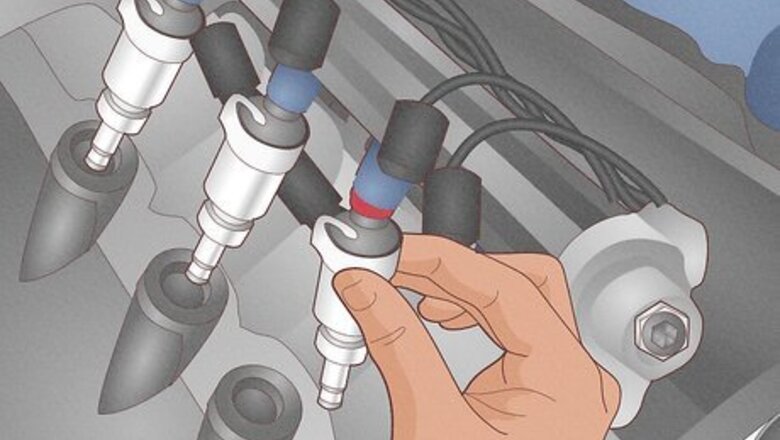
views
Dirty Fuel Injectors
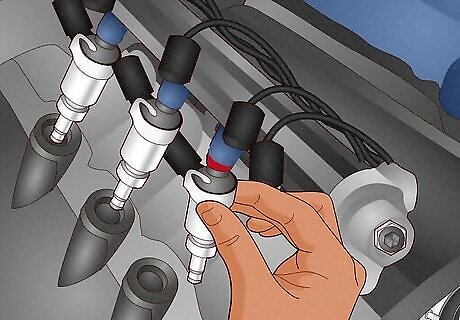
Check the injectors if you also experience misfires and you stall at idle. Your fuel injectors are mounted inside of the engine intake manifold, which is usually located directly on top of the engine’s cylinders. They’re responsible for providing the fuel in the “fuel + spark + air” formula your vehicle uses to run, so if they’re damaged or dirty, your engine will jerk as it fails to get the fuel it needs to run correctly. Other symptoms include: bad fuel mileage, poor fuel economy, a strong fuel smell coming from your engine bay, and a check engine light. The DIY fix: Either replace each of the fuel injectors or remove them and clean them using a fuel injector cleaning kit. Cost for professional repair: If they’re just dirty, cleaning will cost $60-150. If you need replacements, expect to spend $350-700.
Worn Out Spark Plugs
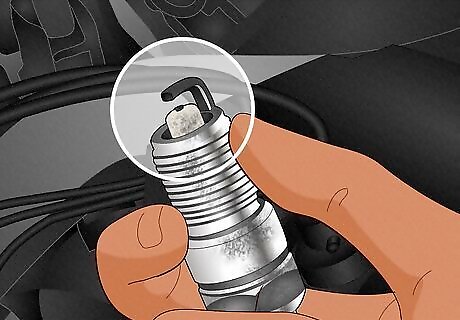
Inspect the spark plugs if you have misfires and trouble starting the car. The spark plugs are also in the engine intake manifold and they provide the literal spark your engine requires to burn fuel. If one or more of the spark plugs is damaged, your engine will struggle to burn enough fuel and the vehicle will jerk as it tries to accelerate. Other symptoms include: Check engine light, extremely slow acceleration, bad fuel economy, and loud knocking sounds coming from the engine. The DIY fix: Remove the old spark plugs from the manifold using pliers and replace the spark plugs. Replace all of the spark plugs, even if only one or two of them is damaged. If a few failed, it’s likely the others will fail soon, too. Cost for professional repair: Expect to spend $100-400 on spark plug replacement. The big variable here is the spark plugs themselves. If you drive a common car, it’ll likely be on the cheaper side.
Dirty Air Filters
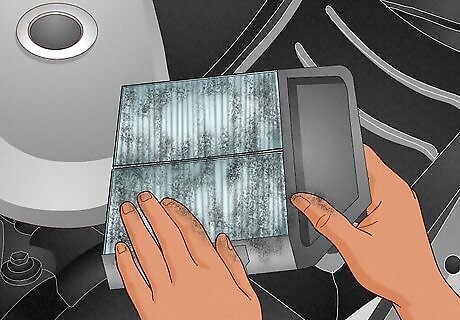
Look for tailpipe smoke, poor acceleration, and bad gas mileage. These symptoms of a dirty air filter are nearly identical to the signs of a bad spark plug or fuel injector, but you’ll also notice black smoke coming from your tailpipe as telltale sign. The air filter blocks dirt and debris from coming into your engine, so if it’s dirty it may interfere with the air flow to your engine. Other symptoms include: Poor acceleration, a check engine light, bad fuel economy, and strange smells in your engine bay and car. The DIY fix: Purchase an air filter designed for your make and model. Find the air box in your engine bay and replace the air filter. Cost for professional repair: This is one of the cheaper repairs. It shouldn’t cost more than a half hour of your time and the labor cost of the mechanic (usually $20-60 an hour).
Bad Fuel Pump
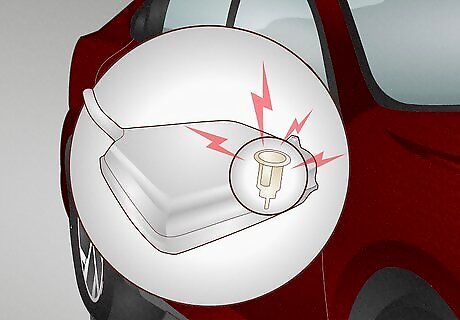
Sputtering and noises in your fuel tank indicate the pump is no good. The fuel pump is responsible for sending the fuel from your fuel tank to the engine. If it’s dirty or damaged, your engine won’t get the fuel it needs to run. Other symptoms include: Your vehicle stalls at random speeds, your acceleration feels uneven, and you have trouble starting the vehicle. The DIY fix: If it doesn’t need to be replaced, locate the pump and clean it by dipping a paintbrush in gasoline and “painting” the filter. It’s actually pretty rare that the pump fails. Usually, it just needs to be cleaned. Cost for professional repair: Replacing the pump will cost $900-1,100. That’s pretty rare, though. A professional cleaning should cost $60-100.
Blocked Catalytic Convertor
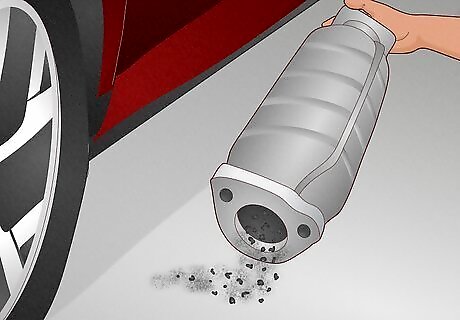
If you smell rotten eggs or sulfur, your catalytic converter is probably bad. The catalytic converter is located in your undercarriage. It absorbs toxic fumes emitted by the engine so that your vehicle doesn’t let dangerous fumes out in the open air. If it’s damaged or blocked, it needs to be replaced since your car won’t be able to get rid of pollutants. Other symptoms include: Bad powertrain performance, extreme heat coming from under your vehicle, and nasty odors. The DIY fix: None, unfortunately. The catalytic converter is full of dangerous chemicals and it’s welded in place. You need a pro for this one. Cost for professional repair: It depends a lot on your vehicle. It can range from as little as $300 to over $2,500.
Faulty EGR Valve
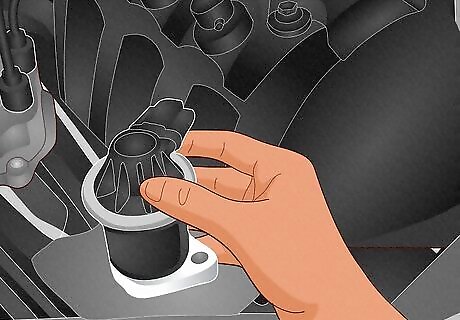
A rough idle and bad engine performance indicate the EGR valve is bad. The EGR (exhaust gas recirculation) valve is a newer feature on modern vehicles. It reduces emissions and improves fuel economy by sending unused gasoline and emissions in the exhaust back into the engine. If the valve is blocked or damaged though, your vehicle’s fuel/air/gas mixture will be incorrect and cause jerking problems. Other symptoms include: Poor acceleration, odd RPM readings on the tachometer, and bad mileage. The DIY fix: Locate the EGR valve in your manual. Then, use a vacuum hose to suck up and particles or gunk stuck inside the valve. If the problem doesn’t go away, replace the valve. Cost for professional repair: This repair is probably going to cost around $350. EXPERT TIP Hovig Manouchekian Hovig Manouchekian Auto Repair & Design Specialist Hovig Manouchekian is an Auto Repair and Design Specialist and the Manager of Funk Brothers Auto, a family-owned business operated since 1925. With over 30 years of experience in the automotive industry, Hovig specializes in the process of auto repair and maintenance. He is also very knowledgeable in common automotive issues and needs including engine repair, battery replacement, and windshield accessory and maintenance. Hovig's knowledge and hard work have contributed to Funk Brothers Auto winning Angie's List Super Service Award for five consecutive years. Hovig Manouchekian Hovig Manouchekian Auto Repair & Design Specialist If your steering wheel shakes when idle, start by looking at common issues. Check for stored or pending codes in your car's computer. Vacuum leaks and fuel pressure issues are common causes of rough idle. Inspect hoses for cracks or disconnections, and use a fuel pressure gauge to verify proper fuel pressure.
Bad Airflow Sensor
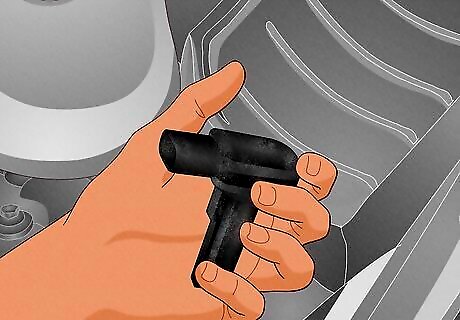
Check the airflow sensor if the engine is erratic and you see smoke. The airflow sensor monitors how much air your engine needs to run smoothly. If that sensor goes bad, your engine will functionally receive random amounts of air. This will lead to basically every engine problem at various points on your drive depending on whether your engine is getting too much air or not enough. Other symptoms include: Black smoke in your hood and exhaust, a check engine light, difficult starts, poor acceleration, stalling, and rough idling. The DIY fix: Purchase a replacement sensor and locate the airflow sensor in your engine bay by reading your manual. Unscrew the old sensor with a screwdriver and clean or install the new one. Cost for professional repair: This shouldn’t cost more than $300. It’s a pretty simple repair.
Moisture Accumulation on the Distributor Cap
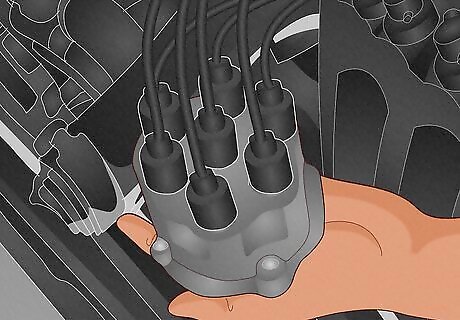
If the jerking only happens in the rain, it’s your distributor cap. On older vehicles, the distributor cap and rotor covers and connects the ignition wires in your engine. If moisture somehow gets inside, it can interfere with the signals in your ignition, which can cause jerkiness. This will notably never happen on dry days with no rain. Other symptoms include: Check engine light comes on when it rains, trouble starting the vehicle, and misfiring. The DIY fix: Locate the distributor cap in your engine bay. Then, either remove the cap and wipe it down to remove the moisture, or replace it entirely. Cost for professional repair: This is an extremely cheap and fast repair. Expect to pay the shop’s labor costs and a few dollars for the cap—probably $50-100.
Damaged Gas Lines
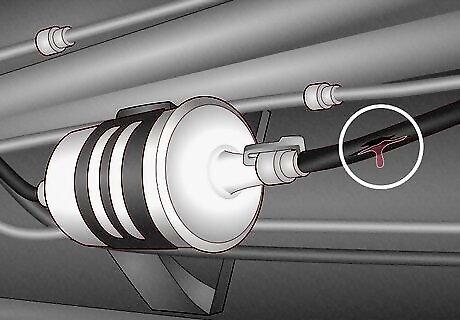
Jerking and a gas odor may mean you have a dangerous fuel leak. Call a tow truck ASAP to get this one repaired. A leaky gas line poses an extremely dangerous situation since it’s one of the conditions required for an engine fire. It’s not safe to drive with a leaky fuel line, so call a tow truck to have your vehicle brought to a mechanic for repairs. Other symptoms include: Occasionally, a check engine light. Usually, you’ll just have a strong gas smell and the shaking, though. The DIY fix: Since the risks here are so high, this is not a recommended repair. You can try fixing a leaky gas tank if you’re a seasoned gearhead, but a professional repair is ideal. Cost for professional repair: It depends on the severity of the damage, so it may be as low as $60 to get a fuel line patch, or $1,000 to get an entire fuel rail system replaced.
Transmission Failure
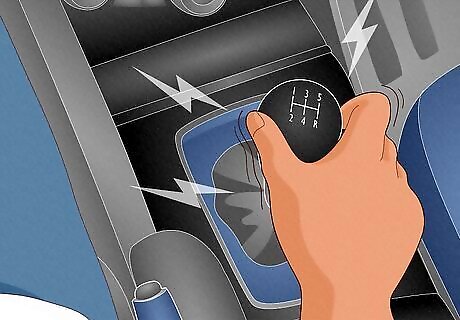
If the jerking occurs during gear changes, it could be your transmission. The transmission is responsible for keeping your engine in the proper gear, so if it’s failing or damaged it can cause engine shaking. The transmission is a crucial component, so don’t drive around for too long if you think the transmission may need work. Other symptoms include: It depends on the extent of the problem. You may see a check engine light, struggle to put your vehicle in reverse, or notice poor engine performance. The DIY fix: Take your vehicle to a pro for diagnosis and repair. If you have transmission experience, you may be able to troubleshoot the problem yourself, depending on the problem. Cost for professional repair: Again, it depends. It may be $100-200 for minor repairs, or up to $3,000 if you need a full rebuild.










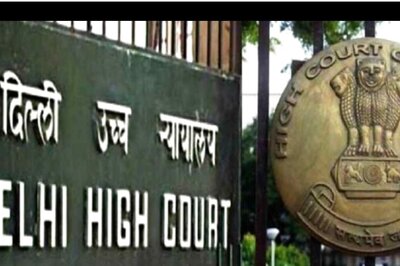





Comments
0 comment